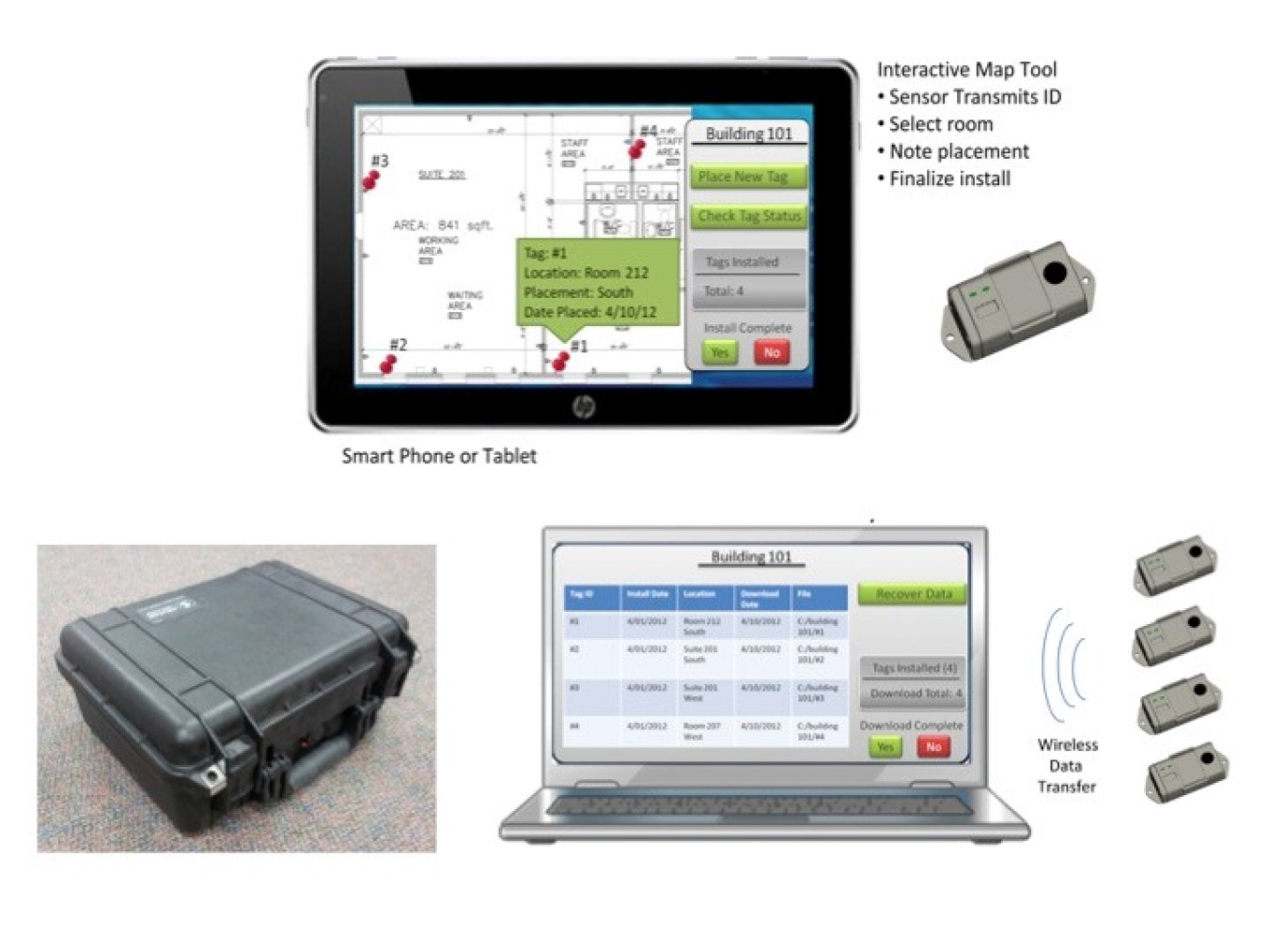
The data module communicates wirelessly with the smart pad, which launches sensors during their installation.
Lead Performers:
-- Pacific Northwest National Laboratory – Richland, WA
-- Lawrence Berkeley National Laboratory – Berkeley, CA
-- Oak Ridge National Laboratory – Oak Ridge, TN
Manufacturing and Vendor Partner: To be determined
DOE Funding: $600,000 (FY 2015)
Cost Share: To be determined. In FY15, this project will identify a manufacturing partner with commitment to 100% of the cost of manufacturing the hardware for prototypes they produce.
Project Term: October 1, 2014 - September 30, 2017 (if all go / no-go milestones are met)
Funding Opportunity: Emerging Technologies / Commercial Buildings Integration Lab Call
PROJECT OBJECTIVE
The Sensor Suitcase is a turnkey hardware and software solution that non-experts can use to generate low- or no-cost recommendations automatically on how to improve a building's operating costs, comfort, and energy performance. The Sensor Suitcase embeds the knowledge and skills of a highly experienced building commissioning practitioner into a scalable hardware and software package that can be easily deployed by a variety of building services personnel to make it easier for building owners and operators to reap the benefits and cost savings for building commissioning. This commercialization project will enable realization of RCx at scale in small commercial buildings in two ways: 1) enabling those without engineering expertise to identify energy-saving operational and comfort opportunities and associated cost impacts; 2) offering commissioning providers the means to streamline existing processes and reduce costs, making it possible to expand their market to smaller buildings.
This project, a DOE national lab-industry partnership, will address the technical and business planning activities to move the RCx sensor suitcase technology from early prototype testing to commercial availability. FY 2015 will focus on commitments from a manufacturing partner and one or more deployment partners, the initial path-to-market plan, techno-economic analysis, and target market definition, with extended field tests of the first-generation RCx sensor suitcase prototype in a set of three buildings to gauge deployment partner satisfaction, interest and performance validation. FY 2015 activities also include partner development of a next-generation product prototype with lab technical assistance.
PROJECT IMPACT
Most commercial buildings in the U.S. don't perform as energy-efficiently as they could simply because energy-using equipment in the building has never been set up to maximize energy performance. Thermostat set points are too low or too high, so rooftop units (RTUs) cool buildings down below recommended temperatures, or keep them too warm (or both). Or, there is no difference in the set point during hours when the building is unoccupied versus occupied — turning the heat and space conditioning down during unoccupied hours helps lower energy bills substantially.
These are only a few of the problems that energy performance professionals see in the field, problems they can correct through retrocommissioning — the process of assessing the energy performance of an existing building, and then tuning its systems, and implementing no- or low-cost energy-efficiency improvements.
In smaller commercial buildings, efficiency efforts including retrocommissioning have been hampered by several factors. Small commercial buildings do not typically have budget or business economics that allow investing in enhancements such as comfort and energy improvements. They also don't have in-house staff with the expertise in building systems that can perform retrocommissioning or identify improvement opportunities.
The Sensor Suitcase is a technological solution to these challenges. It offers a turnkey hardware and software solution that non-experts can use to generate low- or no-cost recommendations automatically on how to improve a building's operating costs, comfort, and energy performance. It therefore can help unlock the vast potential for realizing low- and no-cost energy savings in the nation’s small commercial buildings.
CONTACTS
DOE Technology Managers: Amy Jiron, Karma Sawyer
Lead Performers: Dr. Michael Brambley, PNNL; Dr. Jessica Granderson, LBNL; Dr. Teja Kuruganti, ORNL
Related Publications
Retro-Commissioning Sensor Suitcase Fact Sheet (PNNL)
The Retro-commissioning Sensor Suitcase Brings Energy Efficiency to Small Commercial Buildings (LBNL)

